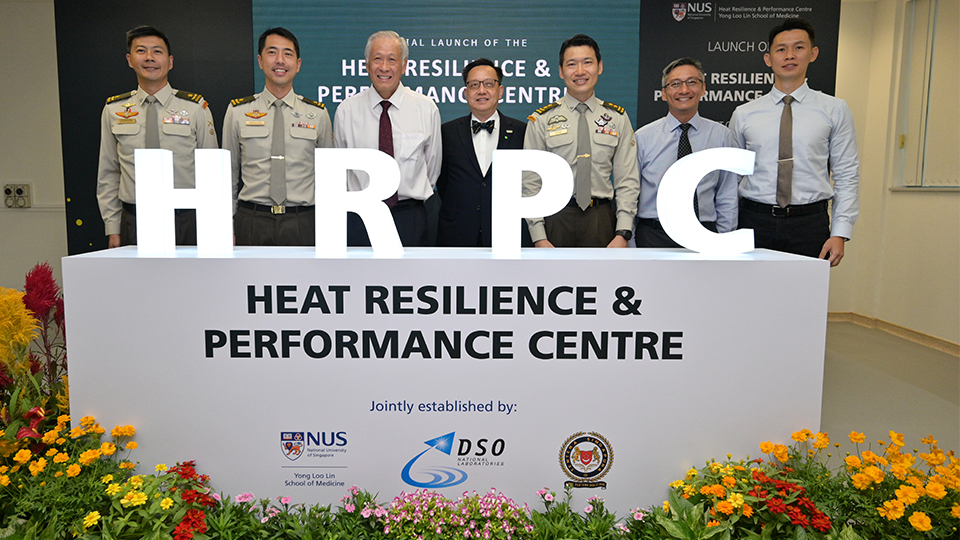New Heat Resilience and Performance Centre to focus on boosting human resilience to rising ambient heat
Published: 11 Jan 2023

Caption: The new Heat Resilience and Performance Centre was launched today, by Guest-of-Honour, Minister for Defence Dr Ng Eng Hen (third from left).
What if there is a network of wireless sensors that can capture and assess an individual’s heat status before he reaches the point of overexertion? Or an intelligent fabric which collects and stores data patterns happening in the human body?
These are just some of the cutting-edge solutions and strategies that the new Heat Resilience and Performance Centre (HRPC) is looking at to build heat resilience and optimise performance in individuals amidst rising ambient temperatures.
The HRPC was launched by Minister for Defence Dr Ng Eng Hen at the Yong Loo Lin School of Medicine, National University of Singapore (NUS Medicine) on Wednesday, 11 January 2023. It marks the start of a tripartite collaboration between NUS Medicine, the Singapore Armed Forces (SAF), and DSO National Laboratories (DSO). The Memorandum of Understanding was signed by the representatives of the three organisations on 25 February 2022.
Occupying 1,000 square feet of research space within the campus of NUS Medicine, the new centre aims to leverage best-in-class local and global expertise, including thermal physiologists and climate researchers, to address long-term challenges of maintaining human performance amidst rising ambient temperatures facing the region and the world.
In his opening address, Dr Ng highlighted how the tripartite cooperation aims to further strengthen linkages between operations, technology and research institutions, tap into local and global expertise, and leverage key technology enablers like deep data science and Artificial Intelligence to develop innovative heat mitigation strategies. He said, “The pool of local experts in the field of heat injury prevention is limited. The HRPC will tap into the best-in-class researchers from both local and overseas…this work of HRPC will be increasingly important for the health of not only our soldiers but the general public as our ambient temperature rises.”
As a dedicated, one-stop research entity that brings together subject matter experts from the local defence ecosystem and NUS Medicine, to drive and conduct heat resilience and performance research, HRPC will contribute to and leverage national efforts to contribute towards national initiatives to meet similar challenges related to rising global temperatures.
Concurrently, the centre aims to be the bedrock where the creation and testing of new hypotheses happen so as to create more forward-looking, impactful solutions that continually deepen the understanding of heat physiology to mitigate heat injuries and boost human performance.
Assoc Prof Jason Lee, Director of HRPC, added, “In addition to heat injuries and performance degradation, excessive heat stress can also compromise decision-making, leading to accidents. Not known to many, heat can be an enabler for physiological adaptations if we know how to use it correctly. The HRPC seeks to add value to the expanding narrative of heat health and performance research to provide forward-looking solutions, that proactively augments heat resilience in our people amidst rising global temperatures.”
The HRPC will focus on three key research thrusts.
Discover — Build a robust database through the aggregation and analysis of existing and emerging data which allow the development and continuous refinement of physiological research models. These data-driven capabilities will sharpen the centre’s research focus, drive the testing of new research hypotheses, and uncover new mechanisms and predictive factors. This will enable HRPC to be at the forefront of discovering, developing and refining solutions for heat resilience.
Detect — Visualising and making sense of an individual’s heat-health and readiness status. This thrust focuses on developing the capability to visualise and interpret the heat-health status of individuals in real-time, allowing for the development of personalised training programmes for heat management, active risk management and training optimisation. These algorithms can not only predict the risk of heat injury, but also personalise training to be more time efficient, improve performance and yield greater results from heat resilience training.
Strengthen — Developing state-of-the-art tools and technology-enabled approaches to boost heat resilience. This thrust explores different advanced technologies and approaches, to develop more efficient strategies for heat resilience in humans. Investigations into these technologies will be guided by in-depth understanding of physiology, biology, psychology, as well as the social and behavioural responses to rising heat.
Read the press release here.
News Coverage

